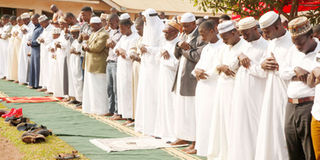Sittat or Ramadan debt first?

Before and after Ramadan. One wonders whether to carry on with the extra days of fast or compensate the prayer debt. PHOTO/RACHEL MABALA
What you need to know:
- What Now? Imagine fasting for 36 days and you are rewarded as if you fasted for 360 days or a year. That’s the jackpot ambitious Muslims target by adding six optional days of fasting after Ramadan. But what if you missed some days during Ramadan? Abdul-Nasser Ssemugabi explores the options.
Today is the eighth day of Shawwal, the tenth month of 1441, according to the Islamic calendar. Meaning, there are three weeks left for Muslims to observe Sittat, the six extra days of fasting after Ramadan.
Those who begun immediately after Eid el-Fitr, and consecutively, finished the six days yesterday and are only praying that Allah accepts their sacrifice and rewards them abundantly. But some, who missed days in Ramadan, still wonder: do I begin with the mandatory Ramadan debt or the optional Sittat?
Who is indebted?
People can miss some days or the whole of Ramadan for reasons such as pregnancy, post-natal bleeding, breastfeeding, menstruation, travel, or sickness. Such conditions are temporary and one must observe the missed days afterwards. Only the terminally ill are exempted from fasting because they are never expected to get out of harm’s way. And the only way they can make up is by feeding the needy, if they can.
Observing Sittat, plus Ramadan makes 36 days. Each day, according to Prophet Muhammad, is rewarded tenfold, meaning one will be rewarded as if they fasted for 360 days or a year.
Sittat is optional and has no specific pattern. But it can only be observed during Shawwal, the Islamic equivalent of October. Missing it is not punishable. But missing days in Ramadan is an eternal debt until it is paid.
In one of his Sunday lectures at Makerere University Mosque, Muhammad Ssekkadde said biologically, after Ramadan the human body needs food, which makes Sittat a huge sacrifice that must be rewarded well.
He added that Sittat is a sign that one’s Ramadan has been accepted, and “It is also one’s way of appreciating what Allah did for you in Ramadan.”
That said, we now know Sittat and the Ramadan debt are important in maximising benefits. And the time factor becomes the gist.
Sittat span lasts only a month. Yet the Ramadan debt can be paid anytime in the 11 months before another Ramadan.
“Last year, I almost failed to pay the Ramadan debt,” says Hashima Sanyu, in her late 20s. “That’s why this time I began repaying them immediately after Eid.”
Cognizant of the immense rewards for Sittat, Sanyu would also want to observe it after making up the eight days she missed during her menstruation. But that will depend on her self-motivation and of course her husband. Because outside Ramadan, a woman should seek her husband’s permission to fast.
That is partly why others are still undecided on what to do first.
Way out
Hassan Nsubuga, the Imam at Uganda Revenue Authority, Nakawa, emphasises the importance of Sittat and advises that if one cannot pay the Ramadan debt, and then observe Sittat before it expires. It is okay to observe Sittat first, and make up the Ramadan days later.
Ssekkadde subscribes to the same view. They base their advice on the confession of Aisha, one of Prophet Muhammad’s wives, when she said that sometimes she could make up the days missed during Ramadan in Shaban of the following year. (Shaban is the eighth month of the Islamic calendar which precedes Ramadan).
They argue that it is unlikely that the Prophet’s wives missed the immense rewards of Sittat. Rather, according to the hadith, they could have observed Sittat first and repaid their Ramadan debts later.
There is a school of thought that one should not prioritise optional ahead of mandatory. Nsubuga begs to differ. “I think those are opinions based on personal reasoning, not evidence.”
He adds: “You can’t afford to miss the rewards for Sittat,” Nsubuga says. “Being rewarded as if you have been holy, fasting, praying, offering charity, supplicating, and repenting for a full year cannot be overstated. It is Paradise guaranteed.”
He advised husbands to be considerate and supportive to their wives when they seek to maximize the benefits of fasting.




